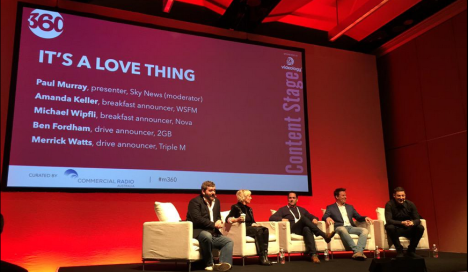The programming/sales divide in radio is becoming more ‘fluid’ says Amanda Keller

Radio panel at Mumbrella360 L:R Paul Murray, Amanda Keller, Michael Wipfli’ Wippa’, Ben Fordham, Merrick Watts
WSFM Breakfast host Amanda Keller has said the lines dividing sales from programming have recently become more “fluid” and that she believes the divide will further evolve in the coming years.
“In the old days, even a few years ago, as presenters that (advertising) wouldn’t be our role,” said Keller speaking at the Mumbrella360 conference. “We turn up to work and that was programming and that was separate from marketing, it was separate to social media, separate to sales.
“Now it far more fluid and I’m not naive enough to think that’s not the future.”


Tint typo alert: “role”, not “roll”
Thanks Angus – fixed up now.
Cheers, Alex – editor, Mumbrella
Lawsie “integrated” material into his radio show which resulted in the “cash for comment” enquiry and the famous “I’m an entertainer” defence. There is a fine line between information and advertising that listeners may not be able to distinguish in an integrated format. Such “advertorial” content could also be construed as an endorsement by the station and the presenter.